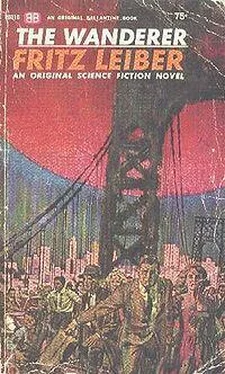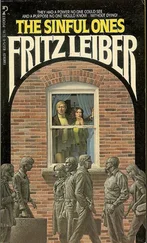Tiredness took hold; the lights dimmed; he sprawled full length on the bed, but at the same time his mind became ripplingly active, began to babble — though in a quite orderly sort of way.
The effect, which was rather like that of sodium pentothal, was almost pleasant. At least, it neutralized his restless anxiety.
It occurred to him that they were getting at his mind, examining it, but he didn’t care.
It was engrossing to watch his thoughts, his knowledge, and his remembered experiences arrange themselves in ranks and then parade, as if past some central reviewing stand.
Eventually these mental items began to move too swiftly for him to follow them, but even that was all right, because the blur they made was a warm, tender, enfolding, somnolent darkness.
The freaks of the monster tides were innumerable, as the Wanderer-humped waters washed around the world.
Currents in straits like Dover, Florida, Malacca and Juan de Fuca became too strong for steamers to breast. Small boats were gulped down like chips in a millrace.
High bridges built to hang firm against winds had their resistance tested to rushing water. They became barriers to ships, which piled up against and broke them.
Moored steamers lifted their docks, or broke free and lodged in the downtown streets of ports, shouldering in the walls of skyscrapers.
Lightships were torn from their great chains, or dragged down by them. Lighthouses were inundated. The Eddystone Light gleamed on for hours in the deeps after it went under.
The permafrost of the Siberian and Alaskan coasts was ripped from below and melted by salt water. In America and Russia atomic-armed rockets drowned in their silos. (One inland newspaper suggested atomic bombs be used to blow the water back.) High-tension lines were shorted out and reappeared six hours later draped with wreckage.
The tiny tides of the Mediterranean became big enough to create disasters of the same magnitude that low-lying oceanic ports regularly suffer from hurricane combined with a high lunar tide.
The Mississippi’s fresh water was spread thin over the salt tide pushing up from the Gulf across its delta to cover the streets of New Orleans.
The Araiza brothers and Don Guillermo Walker encountered a similar phenomenon on the San Juan. Late in the afternoon the river reversed its current, spread into the jungle to either side, and began to taste brackish. Wreckage appeared, floating upstream. They cursed in wonder — the Latins with a certain reverence, the Yankee theatrically, drawing a bit on King Lear — and headed the launch back for Lake Nicaragua.
The population of great ports found refuge on inland hills or — less securely — in the upper floors of tall buildings, where dreadful little wars were fought for living space. Airlifts rescued a random scattering. Heroic and merely stubborn or incredulous people stuck to posts of duty. One of these was Fritz Scher, who stayed on all night at the Tidal Institute. Hans Opfel, braving the shallowly flooded Hamburg streets, went out for supper, promising to return with a Bratwurst on rye and two bottles of beer, but he never came back — overpowered by floodwaters or his own sense of self-preservation.
So Fritz had no one at whom to direct his mocking laughter when the tide went down during the evening hours. And later, around midnight, he had only the tide-predicting machine with whom to share his rationalizations as to why the tide had gone down so far, according to the very few reports that were still trickling in. But that rather pleased him, as his devout affection for the long, sleek machine was becoming physical. He moved his desk beside her, so he could touch her constantly. From time to time he went to a window and looked out briefly, but there was heavy cloud cover, so his disbelief in the Wanderer was not put to the crucial test.
Many of those fleeing the tides ran into other troubles that made them forget the menace of the waters. At noon, Pacific Standard Time, the school bus and the truck carrying the saucer students were racing against fire. Ahead, walls of flame were swiftly climbing the saddle-backed ridge along which Monica Mountainway crossed the central spine of the Santa Monica mountains.
Barbara Katz watched the tiny bow wave from the left front wheel of the Rolls Royce sedan angle across the road and lose itself in the tall green swords of the saw grass, as Benjy stubbornly kept their speed down to a maddeningly monotonous thirty. As captain of the car, at least in her own estimation, she ought to be sitting up in front, but Barbara felt it was more vital that she keep in direct contact with her millionaire, so she sat behind Benjy with old KKK beside her and Hester beyond him, which put Helen up in front with Benjy and a pile of suitcases.
The sun had just begun to look into the front of the car from high in the sky as they traveled due west through the Everglades. The windows were all closed tight on Barbara’s side and it was hot. She knew that Lake Okeechobee ought to be somewhere off to the right and north, but all she could see was the endless green expanse of saw grass, broken here and there by clumps of dark, mortuary-looking cypress, and the narrow, mirrorlike corridor of water ahead covering the string-straight, level road to a depth of never less than one inch or more than four — so far.
“You sure right about that high tide, Miss Barbara,” Benjy called back softly and cheerily. “She come way in. Never hear tell she come so far.”
“Hush, Benjy,” Hester warned. “Mister K still sleeping.”
Barbara wished she were as confident about her own wisdom as Benjy sounded about it. She checked the two of old KKK’s wrist watches strapped to her left wrist — two-ten, they averaged — and the time for today’s second high tide at Palm Beach on the back of the calendar sheet — 1:45 p.m. But wouldn’t a high tide moving inland be later than on the coast? That was the way it was with rivers, she seemed to recall. She didn’t know nearly enough, she told herself.
An open car moving at almost twice their speed roared past them, deluging the Rolls with water. It forged swiftly ahead, beating up a storm in the water-mirror. There were four men in it.
“Another of them speeders,” Hester growled.
“Wowee! Sure lucky we Sanforized,” Benjy crowed. “I Sanforize this bus with lots of high-yellow grease,” he explained. Helen giggled.
The encounter roused old KKK, who looked at Barbara with red-rimmed, wrinkle-edged little eyes that seemed to her to be almost awake for the first time today. He’d gone through the preparations and actual departure in a kind of stupor that had alarmed Barbara but not Hester. “He just not had his sleep out, he be all right,” Hester had told her.
Now he said briskly: “Phone the airfield, Miss Katz. We want two tickets to Denver by the next plane out. Triple premiums to the reservation clerks, the pilot, and the air line. Denver’s a mile high, out of reach of any tides, and I have friends there.”
She looked at him frightenedly, then simply indicated their surroundings.
“Oh yes, I begin to remember now,” he said heavily, after a moment. “But why didn’t you think of the air, Miss Katz?” he complained, looking at the black shoulder bag of the Black Ball Jetline on her lap.
“I borrowed this from a friend. I hitchhiked down from the Bronx. I don’t fly much,” she confessed miserably, feeling still more miserable inside. Here she’d been going to rescue her millionaire so brilliantly and — dazzled by a Rolls Royce sedan — had missed the obvious way to do it, maybe doomed them all. Dear God, why hadn’t she thought like a millionaire!
A corner of her mind outside the misery area was asking whether old KKK had made a slip in mentioning just two tickets. Surely he’d meant five — why, he talked to Hester and Helen and Benjy like they were his children.
Читать дальше










